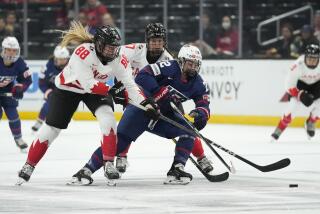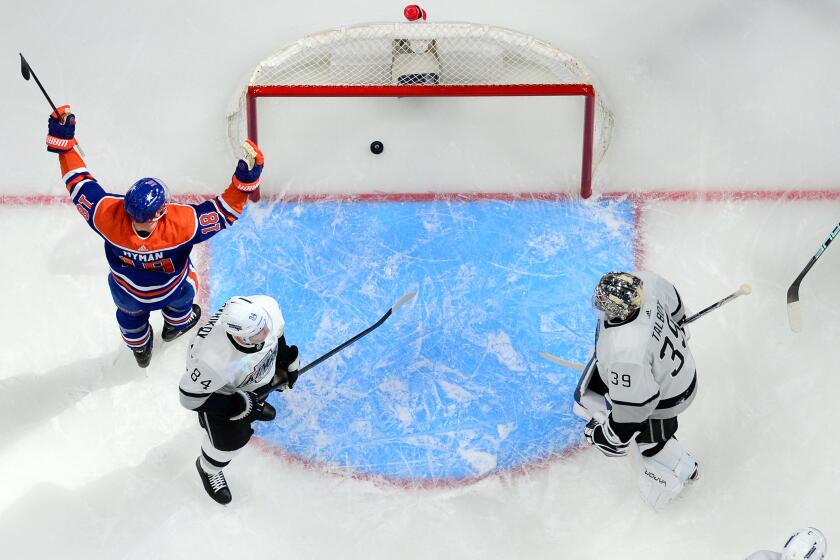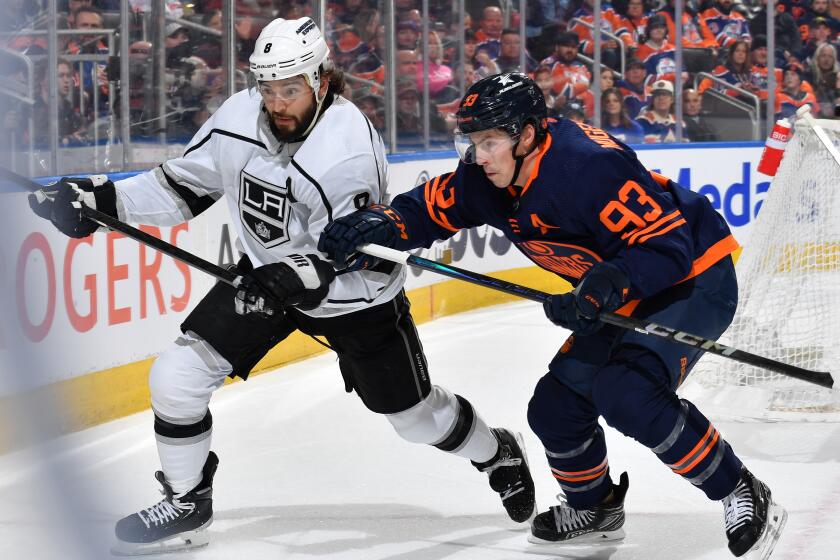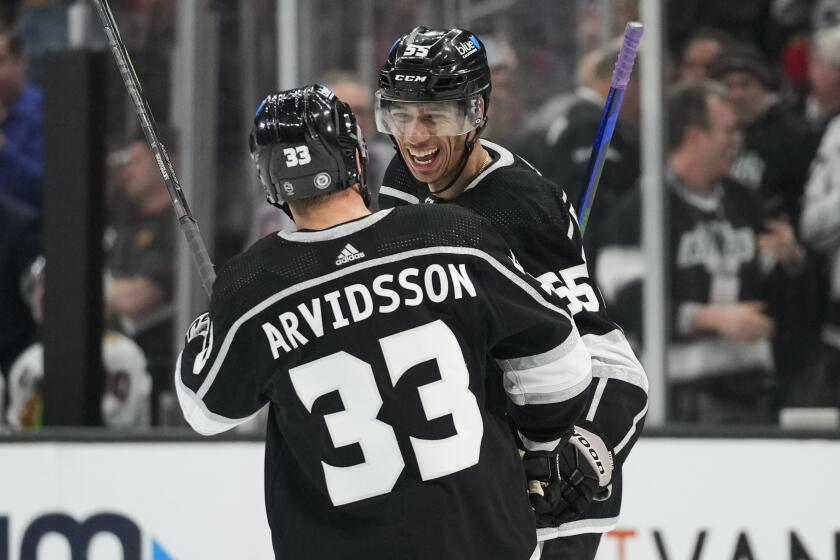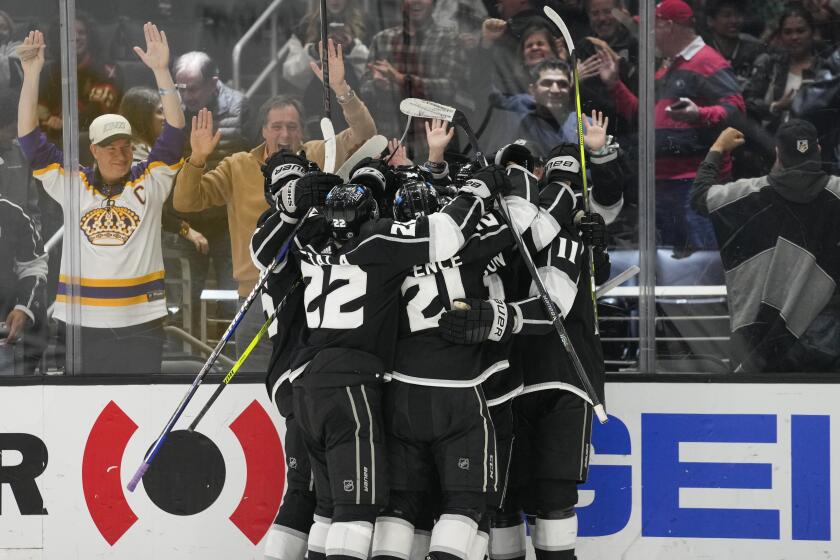NHL Sets Alarm Clock
NHL Commissioner Gary Bettman said Wednesday he would cancel the 2004-05 season unless the league and union found long-elusive common ground and put a new collective bargaining agreement on paper before Monday.
The likelihood of reaching an accord in time to play a 28-game, last-resort schedule is “very daunting,” Bob Goodenow, executive director of the NHL Players’ Assn., said after rejecting a proposal delivered to his Toronto office by Bettman and Bill Daly, the NHL’s chief legal officer.
The league had delayed setting a deadline because it believed Goodenow would therefore delay his best offer -- and because it wants to document that it bargained in good faith if it tries to declare an impasse and implement labor conditions. However, Bettman said practicality prevailed.
“For us, it’s always been about making the right deal. The time frame is not relevant,” he said during a conference call with reporters. “Having said that ... if we’re not actively engaged in drafting documents this weekend, I don’t see how we can have a season.”
Becoming the first major professional sports league in North America to cancel a season would be “terrible,” Bettman said. But he also said the NHL had “given all we can give and we’ve gone as far as we can go....
“The deal can only get worse as a technical matter and as an economic matter the longer we go without a new deal. That’s not a threat. That’s simply a reality of where we find ourselves.”
Minutes later, Goodenow said the NHL proposal was “not a basis for an agreement that we would engage in,” and said he saw nothing to build upon. However, he and Ted Saskin, the NHLPA’s senior director, invited Bettman and Daly to talk again Wednesday night or today, and Bettman agreed. Each side might also bring outside counsel.
The lockout has wiped out 813 regular-season games, millions of dollars in revenue and the goodwill of even the most loyal fans, yet each side is clinging to a philosophical shield.
Bettman wants to achieve cost certainty through a salary cap or linking salaries to league revenues. A report commissioned by the NHL and issued a year ago said clubs had devoted 75% of league revenues to player costs, far more than the NFL, NBA or Major League Baseball but with fewer revenue streams to support them.
The union contends clubs can manage their budgets without the artificial restriction of a salary cap. It opposes linking payrolls to revenues because it believes clubs underreport revenues, which would depress payrolls.
The proposal presented on Wednesday by Bettman and Daly blended two concepts.
It began with the framework of the union’s Dec. 9 proposal: a 24% salary rollback and a luxury tax starting at 20 cents on the dollar and rising to 60 cents for clubs whose payrolls exceed $45 million. However, the NHL attached four economic conditions that, if triggered, would void the agreement and replace it with a plan the NHL had outlined on Feb. 2. That plan set a team salary range of $32 to $42 million, including player benefits, and linked payrolls to 53 to 55% of league revenues.
The NHL’s plan would have kicked in if player compensation exceeded 55% of revenues; the average payroll of the three highest-payroll clubs was more than 33% higher than the average of the three lowest-payroll clubs; the payroll of any three clubs exceeded $42 million, or the average of league-wide player compensation rose above $36.5 million.
“We really gave this our best shot. This is what we really believe we need,” Bettman said. “It’s frustrating [to be rebuffed].... It’s a tragedy.
“The economics of the business do not sustain what the players’ association wants us to do. Part of the problem is the expectation level we created for players is tremendous. We’ve been paying too much for too long, and now we’re dealing with reality.”
Goodenow said the union rebuffed Wednesday’s offer because he believed the payroll of three clubs would exceed $42 million and result in immediate imposition of the league’s salary cap/revenue linkage plan.
“We both sides know each other, where we are, and if there’s a sincere initiative to negotiate and get an agreement we’re willing to sit down and work for hours and days to get that taken care of,” Goodenow said, “but to date we really haven’t had the foundation on which to do that.”
A canceled season would raise countless questions, including who would get the right to draft and sign teen phenom Sidney Crosby, hailed as the next Wayne Gretzky. It would also end a tradition of the Stanley Cup’s having been awarded every year but one since 1893. The exception was 1919, when the final ended because of a flu epidemic that caused the death of Montreal’s Joe Hall.
“This is damaging, it’s bad news for all involved,” said Paul Swangard, director of the Warsaw Sports Marketing Center at the University of Oregon. “But the status quo was going to be even worse. It would have led to hockey Armageddon. Maybe this will lead to the sport in a different form, with fewer teams, healthier markets and a business model that works. For the owners that stick around, maybe that’s the best they can hope for.”
He said a shortened season would be “a fairly unique product. It would have been the best the sport has to offer, where every game matters. It could have built nice momentum into next year.”
*
(Begin Text of Infobox)
NHL LOCKOUT
* Days of lockout: 147.
* Days of season missed: 120.
* Total games missed: 813 of the 1,230 regular-season games plus the 2005 All-Star game.
*
Key Negotiating Points
The key points in the NHL’s proposal on Wednesday to the players’ association:
* Starting point: Putting union’s Dec. 9, 2004, proposal in effect and playing under that luxury-tax system until one of four financial limits is exceeded. That would trigger a switch to the league’s salary-cap system proposed Feb. 2, 2005.
* Salary rollback: The players’ association original offer of a 24% rollback on all existing contracts was in both proposals.
* Triggers: Any of these factors would force the proposals to switch from the union’s offer to the league’s offer.
-- If player compensation exceeds 55% of league-wide revenues.
-- If the average payroll of the three highest-spending teams is more than 33% higher than the average payroll of the league’s three lowest-spending teams.
-- If three teams go over $42 million in player compensation.
-- If the average compensation of the 30 teams exceeds $36.5 million.
*
Associated Press
More to Read
Go beyond the scoreboard
Get the latest on L.A.'s teams in the daily Sports Report newsletter.
You may occasionally receive promotional content from the Los Angeles Times.


